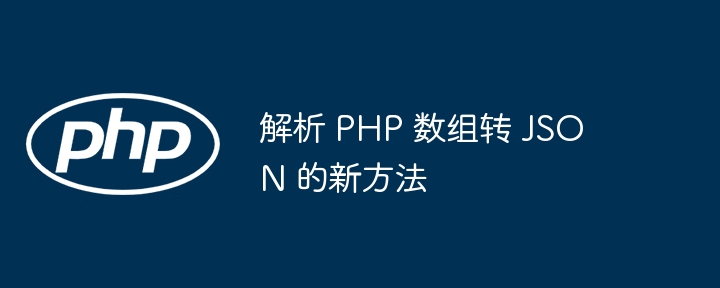
PHP There are two new methods for converting arrays to JSON: JsonSerializable interface: allows objects to define their own JSON representation. JSONEncodeReplaceFlags: Controls the handling of special characters, such as JSON_UNESCAPED_UNICODE not escaping Unicode escape sequences.

New way to parse PHP arrays to JSON
Converting arrays to JSON strings in PHP is a common task. The traditional json_encode() function provides this functionality, but in recent years, new methods have emerged that provide additional functionality and performance benefits.
JsonSerializable interface
PHP 5.4 introduces the JsonSerializable interface, which allows objects to define their own JSON representation. To implement this interface, an object must implement a jsonSerialize() method that returns the data to be converted to JSON. For example:
class Person implements JsonSerializable {
private $name;
private $age;
public function __construct($name, $age) {
$this->name = $name;
$this->age = $age;
}
public function jsonSerialize() {
return [
'name' => $this->name,
'age' => $this->age
];
}
} You can use the json_encode() function to convert the Person object to JSON as follows:
$person = new Person('John Doe', 30);
$json = json_encode($person);jsonSerialize( ) method will be used to generate a JSON representation, providing more control over the conversion process.
JSONEncodeReplaceFlags
PHP 7.4 introduced the JSONEncodeReplaceFlags option, which allows controlling the handling of special characters during conversion. This option can be used with the json_encode() function as follows:
$array = ['a' => "\u00A0", 'b' => "\n"]; $json = json_encode($array, JSON_UNESCAPED_UNICODE);
In this example, the JSON_UNESCAPED_UNICODE flag is used to preserve escape sequences, thus generating The following JSON:
{
"a": "\u00A0",
"b": "\n"
}Practical case: RESTful API
When building a RESTful API, it is often necessary to convert PHP arrays to JSON to respond to client requests. Here is an example using the JsonSerializable interface and the JSON_UNESCAPED_SLASHES flag:
header('Content-Type: application/json');
class User implements JsonSerializable {
// ...
}
$user = new User(...);
$json = json_encode($user, JSON_UNESCAPED_SLASHES);
echo $json;This code will generate a JSON response that does not escape forward slashes, making it suitable for Response containing a URL or path.
The above is the detailed content of A new way to parse PHP arrays into JSON. For more information, please follow other related articles on the PHP Chinese website!